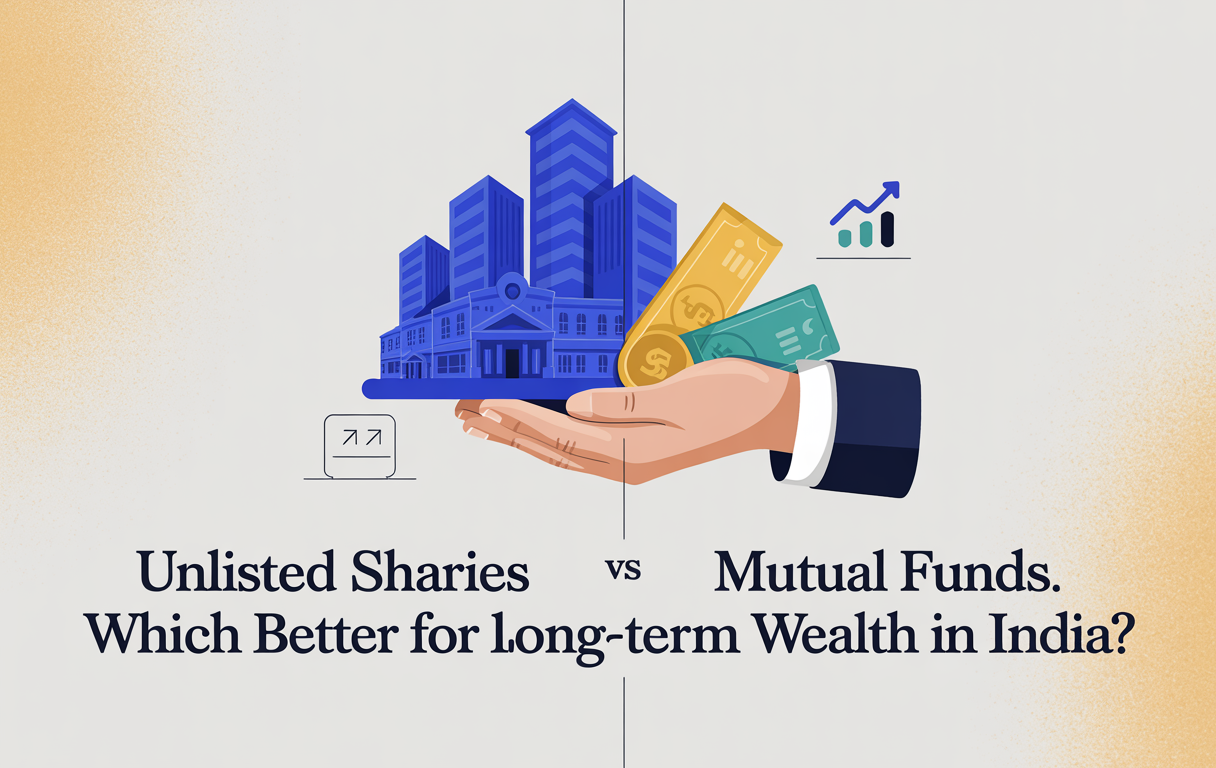Are you an Indian investor looking to grow your money over the long term? Do you ever wonder if you should put your savings into traditional mutual funds or explore the exciting world of unlisted shares? It’s a common question. Both options offer unique benefits and risks, especially when it comes to building wealth over many years in India.This article will break down unlisted shares and mutual funds. We’ll compare them side-by-side, aiming to help you understand which one might be a better fit for your financial journey. Ready to dive in?
What Are Unlisted Shares? The “Early Bird” Advantage
Unlisted shares are simply shares of companies not yet traded on public stock exchanges like NSE or BSE. Think of them as stocks of private companies. These could be startups, growing businesses, or even well-established companies planning an Initial Public Offering (IPO) in the future.When you buy unlisted shares, you invest directly in a company’s equity before it becomes public. Imagine investing in a startup like Zomato or Nykaa before their IPOs. That’s the “early bird” advantage. You become an early owner, hoping the company grows into a household name and lists on an exchange. If it does, your initial investment could grow exponentially.
What Are Mutual Funds? Your “Professional Partner”
Mutual funds are a popular investment choice for many. They’re a pool of money collected from many investors. Professional fund managers then invest this money in various assets like stocks, bonds, or other securities.Mutual funds offer diversification, which means your money is spread across many different investments. This helps reduce risk. Asset Management Companies (AMCs) manage them, and SEBI in India regulates them. You buy “units” of a mutual fund, and their value changes daily based on the Net Asset Value (NAV).
Unlisted Shares vs Mutual Funds: A Deep Dive
Let’s compare these two investment avenues across crucial aspects. This’ll help you pinpoint the key differences for your long-term wealth goals.
Risk and Volatility: High Stakes vs Managed Exposure
Unlisted shares come with very high risk. You’re betting on a single company, or a few. There’s a chance the business might fail. Their value can be hard to determine, and market sentiment can change quickly.Mutual funds, especially equity-focused ones, carry market risk. But this risk is diversified. Your money spreads across many companies and sectors. Professional managers also help manage this risk. They’re generally less volatile than individual unlisted shares. So, how much risk are *you* truly comfortable taking?
Return Potential: Explosive Growth vs Consistent Compounding
Unlisted shares offer the potential for explosive returns. Imagine you’d invested in a company like Flipkart or Paytm during its early, unlisted phase your returns could’ve been phenomenal. However, this isn’t guaranteed; many unlisted companies won’t achieve such explosive growth.Mutual funds, over the long term, offer consistent compounded returns. While they might not give sudden multi-bagger returns, they provide steady growth. For instance, well-managed equity mutual funds in India have given average returns of 12-15% or more over 10-15 years.
Liquidity: Locked-In Capital vs Easy Exit
Liquidity is a major difference. Unlisted shares are highly illiquid. Finding a buyer for your shares can be difficult and time-consuming. You might have to wait for an IPO, a company acquisition, or find a private buyer. This means your money can be locked in for years. But what if you need those funds sooner?Mutual funds offer high liquidity. You can redeem your units on any business day. The money usually reaches your bank account within a few days. This makes them a flexible option if you need access to your funds.
Expertise Required: DIY Analyst vs Professional Manager
Investing in unlisted shares needs a lot of research. You need to understand the company’s business, its management, financials, and market opportunity. You’re essentially doing the work of a venture capitalist.With mutual funds, you rely on professional fund managers. They do the research, pick stocks, and manage your portfolio. You just need to choose a fund that suits your goals.
Diversification: Concentrated Bet vs Broad Portfolio
Unlisted share investments are typically concentrated. You usually invest in one or a few companies. This means your risk is very high if those companies don’t perform well.Mutual funds offer automatic diversification. They invest in a basket of stocks across various sectors. This spreads your risk, meaning the poor performance of one company won’t heavily impact your overall investment.
Investment Process and Accessibility: Exclusive Access vs Open for All
Investing in unlisted shares can be a more complex process. It often involves specialized brokers or platforms. The minimum investment amounts are usually higher. You can learn more about the process to acquire unlisted shares on our website.Mutual funds are very accessible. You can invest with small amounts through Systematic Investment Plans (SIPs). They are available through various online platforms and banks.
Costs and Fees: Brokerage & Transfer vs Expense Ratios
When dealing with unlisted shares, you might pay brokerage fees, demat charges, and other transfer-related legal fees. Sometimes, you might even pay a premium for private placements.Mutual funds charge an Expense Ratio. This is a small annual percentage of your investment that covers management fees and operating costs. Some funds might also have an exit load if you redeem before a certain period.
Regulation and Transparency: Limited Oversight vs SEBI Guarded
The unlisted market often has less regulatory oversight compared to listed markets. Public information about these companies is limited. Valuations can sometimes be opaque, or hard to verify.SEBI highly regulates mutual funds. They have strict disclosure requirements. Their valuations (NAV) are transparent and published daily. This provides a greater sense of security.
Taxation in India: Key Differences for Long-Term Gains
Taxation is a crucial aspect for Indian investors. For unlisted shares, if you sell within 24 months, it’s considered Short-Term Capital Gains (STCG). This is added to your income and taxed as per your slab rate. If you sell after 24 months, it’s Long-Term Capital Gains (LTCG), usually taxed at 20% with indexation benefits (which adjust your cost for inflation, lowering your taxable gain). Understanding these details is important when you’re planning the tax implications of unlisted shares.For equity mutual funds, STCG (sold within 12 months) is taxed at 15%. LTCG (sold after 12 months) is taxed at 10% on gains exceeding Rs. 1 lakh in a financial year, without indexation.
Who Should Choose What? An Indian Investor’s Guide
Your choice depends on your financial goals, risk tolerance, and knowledge.
Unlisted Shares Are For:
- Investors with a high-risk appetite.
- Those with a long investment horizon (5-10+ years) and no immediate need for funds.
- Individuals who have significant investable surplus.
- People willing to do thorough research and due diligence (comprehensive research and investigation) on companies.
- Investors seeking potentially explosive, but high-risk, returns.
Mutual Funds Are For:
- Investors with moderate to conservative risk appetites.
- Those who want professional management of their investments.
- People who prefer a diversified portfolio to reduce risk.
- Regular investors using SIPs for disciplined wealth creation.
- Individuals seeking long-term growth without extensive personal research.
- Investors who need easy access to their funds (liquidity).
The Hybrid Approach: Using Both Wisely
You don’t always have to choose one over the other. A smart investment strategy often includes both. You can build a strong core portfolio using mutual funds. This provides stability, diversification, and professional management.Then, you can allocate a small, calculated portion (e.g., 5-10%) of your portfolio to unlisted shares. This allocation should be only after careful research and understanding the risks. This hybrid approach helps balance risk and reward. It allows you to tap into high-growth opportunities while maintaining overall portfolio stability.
Crucial Steps for Unlisted Share Investment
If you decide to explore unlisted shares, thorough due diligence (comprehensive research and investigation) is vital. Research the company’s business model, its leadership team, and its financial health. Understand its market position and future growth potential. Verify the legal ownership and proper share transfer procedures. It’s advisable to use reputable platforms or brokers specializing in this market. For a comprehensive guide to investing in unlisted shares, check out our dedicated resource.
Conclusion: Making an Informed Choice for Your Financial Future
Both unlisted shares and mutual funds offer avenues for long-term wealth creation in India. Unlisted shares offer high growth potential but come with high risk and low liquidity. Mutual funds offer diversified, professionally managed growth with higher liquidity and regulation.There’s no single “better” option. The best choice depends on your individual financial goals, how much risk you’re comfortable taking, and how long you plan to invest. Always assess your situation, conduct your own research, and consider speaking with a financial advisor before making any investment decisions. Which path feels right for *your* financial journey?










